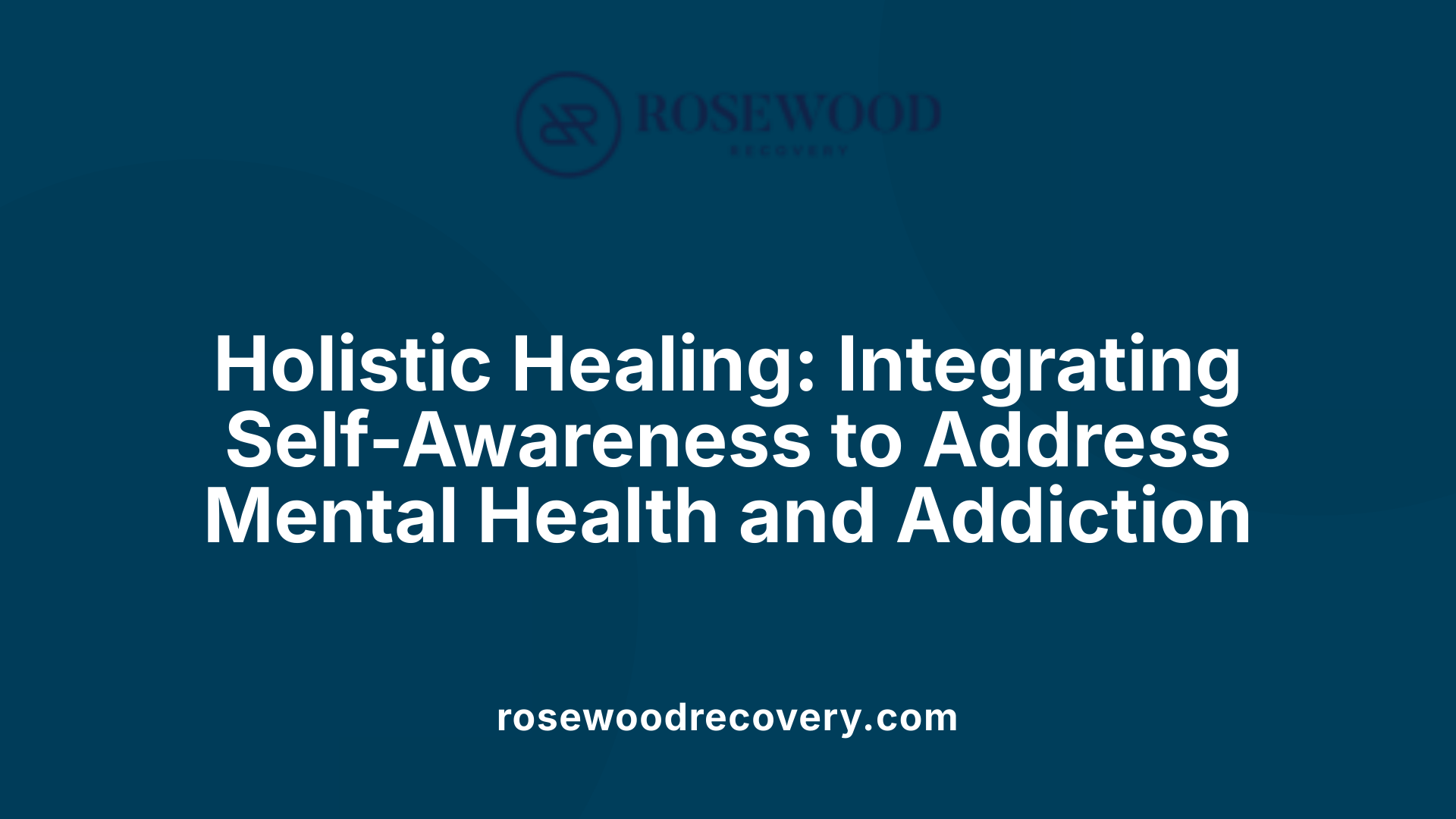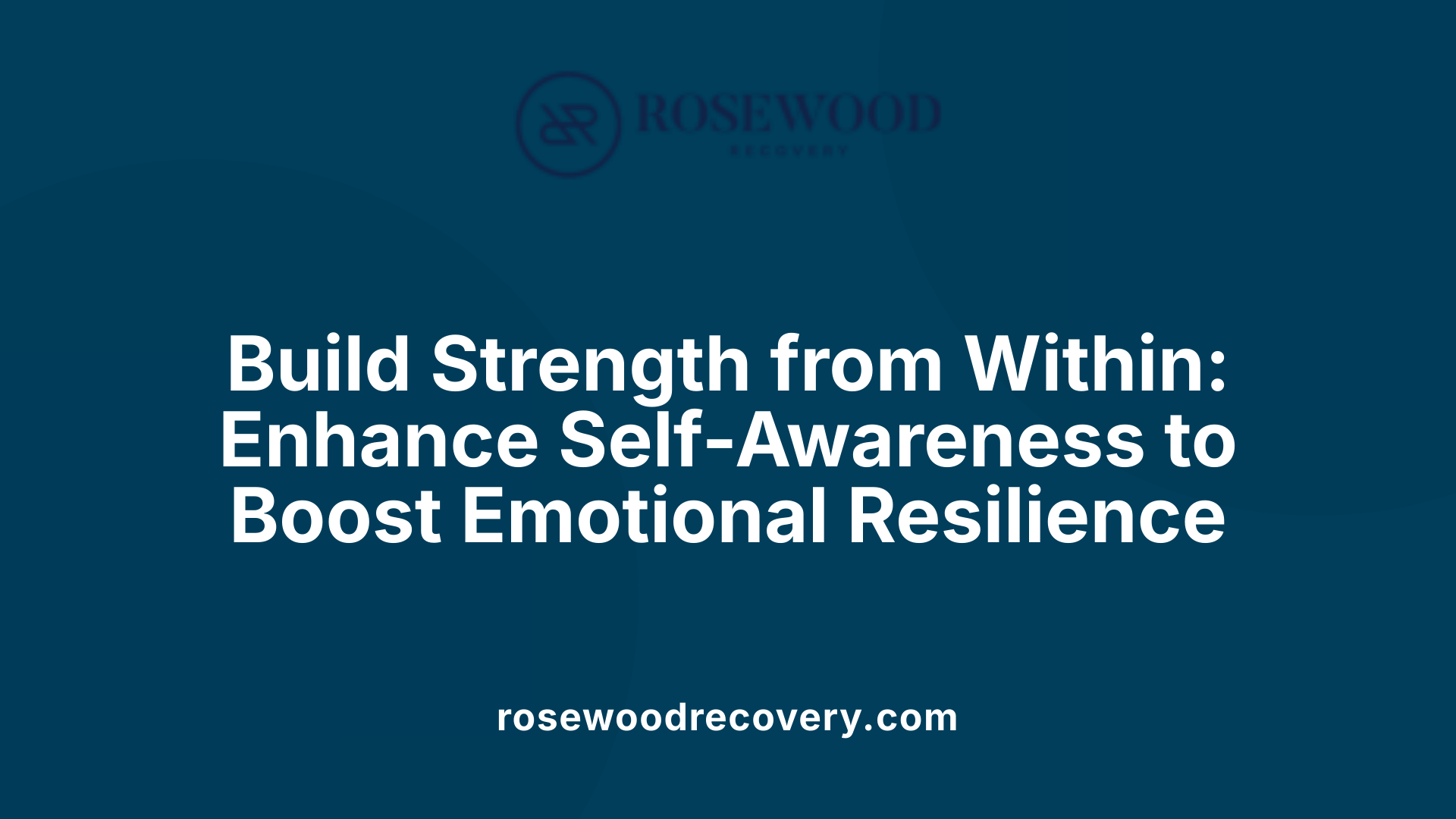Understanding the Foundation of Emotional Healing
Emotional healing, particularly in the context of addiction and mental health recovery, is a nuanced and ongoing process. Central to this journey is self-awareness—a conscious understanding of one’s emotions, thoughts, desires, and behaviors. This article explores how self-awareness acts as a cornerstone for emotional resilience, relapse prevention, and sustained recovery, weaving through comprehensive treatment services and mental health interventions to offer holistic healing.
Comprehensive Treatment Services and the Role of Self-Awareness

What are the comprehensive treatment services available for substance abuse?
Comprehensive treatment for substance abuse offers a variety of tailored services designed to address the multifaceted nature of addiction. These include detoxification phases, outpatient therapy, residential treatment programs, and personalized counseling aimed at supporting long-term recovery.
The importance of tailored interventions in recovery
Treatment plans incorporate behavioral therapies such as cognitive-behavioral therapy (CBT) and dialectical behavior therapy (DBT), which help clients develop self-awareness and coping strategies. Medication-assisted treatment (MAT) uses FDA-approved medications like methadone and naltrexone to manage cravings and withdrawal, bridging critical gaps when formal treatment access is limited.
Behavioral therapies and medication-assisted treatment
Both behavioral and pharmacological interventions are essential. Behavioral therapies focus on emotional regulation, mindfulness, and relapse prevention. MAT supports these therapies by stabilizing brain chemistry and enabling individuals to engage more effectively in behavioral treatment.
Community-based support and recovery residences
Community programs provide comprehensive assessments, case management, and continuous support to individuals and families. Recovery residences offer safe, substance-free environments where individuals can practice self-care and self-regulation. Peer networks in these communities enhance social integration and motivation.
How self-awareness supports these services
Self-awareness is pivotal across all treatment stages. It enables individuals to recognize triggers, understand emotional responses, and make informed decisions, enhancing engagement with therapies and medication regimens. Improving self-awareness through mindfulness, journaling, and therapy fosters emotional resilience, reduces relapse risk, and contributes to sustained recovery.
| Intervention Type | Description | Role of Self-Awareness |
|---|---|---|
| Behavioral Therapies (CBT, DBT) | Develop coping, emotional regulation, mindfulness | Enhances understanding of triggers and responses |
| Medication-Assisted Treatment | Use of methadone, naltrexone for craving management | Supports brain stabilization for better self-regulation |
| Community-Based Support | Assessment, case management, peer networks | Provides social context to practice self-awareness |
| Recovery Residences | Safe environments for sustained sobriety | Facilitates daily self-care and emotional monitoring |
Addressing Mental Health in Addiction Treatment: Integrating Self-Awareness

How are mental health issues addressed in addiction treatment programs?
Mental health challenges in addiction treatment are often managed through integrated care that treats both substance use disorders and co-occurring mental health issues simultaneously. Screening for common conditions like depression and anxiety is crucial in identifying individual needs early on. This allows for personalized care plans that combine pharmacological treatments with evidence-based psychotherapies such as Cognitive Behavioral Therapy (CBT) and Dialectical Behavior Therapy (DBT).
The role of psychotherapies like CBT and DBT in integrated treatment
CBT and DBT are key therapeutic approaches used to enhance self-awareness, emotional regulation, and coping skills in recovery. These therapies encourage clients to observe and understand their emotional patterns and triggers, which is essential for managing cravings and preventing relapse. By promoting introspection and teaching healthy ways to handle stress and negative emotions, CBT and DBT support emotional healing alongside addiction recovery.
Screening and personalized care for co-occurring disorders
Effective addiction treatment involves thorough mental health screening to detect co-occurring disorders. Once identified, treatment plans are tailored to address the unique combination of symptoms and behaviors affecting each individual. This personalized approach ensures that both psychological and physical aspects receive comprehensive attention, improving overall outcomes.
Self-awareness in understanding symptoms and triggers
Self-awareness helps individuals recognize their emotions, thought patterns, and behaviors connected to addiction. Through self-reflection practices—such as mindfulness and journaling—patients gain insights into symptomatology and environmental triggers. Understanding these internal experiences fosters emotional resilience and equips individuals to manage challenges constructively.
Mental health's impact on emotional healing and recovery
Mental health support is fundamental to emotional healing during addiction recovery. Addressing psychological distress facilitates rebuilding positive relationships, improving communication, and enhancing motivation. Integrating mental health care promotes a holistic recovery where emotional well-being and addiction sobriety reinforce each other for sustained healing.
Addiction Types Treated Through a Holistic Approach Centered on Self-Awareness
What types of addiction are commonly treated in comprehensive treatment services?
Comprehensive addiction treatment addresses a range of substance and behavioral addictions. The most commonly treated substance addictions include alcohol, opioids, and stimulants. Behavioral addictions such as gambling and problematic internet use are also within the scope of these programs.
How are addiction and mental health connected in treatment?
Addiction frequently coexists with mental health disorders like anxiety and depression, making integrated care essential. Treating these co-occurring conditions simultaneously ensures a more holistic recovery process, addressing both psychological and physical dependencies.
What therapeutic techniques promote self-awareness in recovery?
Cognitive Behavioral Therapy (CBT) remains a cornerstone approach, facilitating self-awareness by helping individuals identify and modify negative thought patterns and maladaptive behaviors. Other therapies, such as Dialectical Behavior Therapy (DBT) and mindfulness practices, complement CBT by enhancing emotional regulation and reflection.
Why are support groups important in addiction recovery?
Peer support groups create a community environment where individuals can share experiences and receive emotional support. This environment fosters greater self-awareness and empathy, helping reduce feelings of isolation, which is crucial for long-term recovery success.
How do medication management and peer support integrate into treatment?
Medication-assisted treatments like methadone help manage withdrawal and cravings, serving as vital components especially when formal treatment access is limited. These pharmacological approaches are integrated with psychosocial support and peer group participation to create a comprehensive care plan that addresses multiple facets of addiction.
| Addiction Type | Treatment Focus | Role of Self-Awareness |
|---|---|---|
| Alcohol, opioids, stimulants | Pharmacological + psychotherapy | Identifying triggers, regulating emotions, modifying behaviors |
| Behavioral addictions (gambling, internet use) | Cognitive and behavioral interventions | Developing insight into compulsive patterns |
| Co-occurring mental health disorders | Integrated mental health care | Managing symptoms, promoting holistic well-being |
This multidimensional approach ensures that recovery is more than mere abstinence—it promotes improved quality of life, social integration, and emotional resilience through ongoing self-awareness development.
Building Emotional Resilience Through Enhanced Self-Awareness in Recovery

What is Emotional Resilience and Why is It Important?
Emotional resilience refers to the ability to withstand stress, adapt to challenges, and recover from setbacks. In addiction recovery, this resilience is vital as it helps individuals cope with triggers and emotional difficulties without resorting to substance use. Building this strength supports lasting sobriety and relapse prevention.
How Does Self-Awareness Support Emotional Regulation and Stress Management?
Self-awareness allows individuals to recognize their emotions, thoughts, and triggers. By understanding these internal signals, a person can regulate emotional responses effectively and manage stress calmly. This conscious insight reduces impulsivity and promotes healthier coping strategies in recovery.
Therapeutic Approaches That Strengthen Resilience
Cognitive-behavioral therapy (CBT) and dialectical behavior therapy (DBT) are widely used therapeutic modalities that help clients develop reflective skills and healthy coping mechanisms. These therapies encourage introspection, emotional regulation, and accountability, all of which enhance resilience.
Practical Tools to Enhance Self-Awareness and Resilience
Mindfulness practices such as meditation help individuals stay present and reduce anxiety. Journaling serves as an introspective tool to track emotions and thoughts over time, providing a clearer understanding of personal patterns. Nature walks offer a calming environment to reflect and reconnect with oneself.
Role of Empathy and Social Skills in Emotional Healing
Developing empathy improves relationships by fostering understanding and reducing feelings of isolation. Strong social skills enable effective communication and boundary-setting, creating supportive networks crucial for sustained recovery. These interpersonal abilities complement emotional resilience by enhancing connection and emotional well-being.
Leveraging Emotional Intelligence and Motivation in Sustaining Recovery
What are the components of emotional intelligence relevant to recovery?
Emotional intelligence (EI) in recovery encompasses several essential components that aid individuals in managing their journey away from substance use. These include self-awareness, self-regulation, empathy, motivation, and social skills. Self-awareness allows recognizing and understanding one's emotions and their effects on others. Self-regulation helps manage emotions appropriately, reducing impulsive reactions and enabling healthier responses to stress and cravings. Empathy builds stronger relationships by fostering understanding of others' feelings. Motivation, particularly intrinsic motivation, drives individuals toward personal growth and meaningful goals. Lastly, social skills facilitate effective communication and boundary-setting crucial for a supportive recovery environment.
How do self-regulation and intrinsic motivation support recovery?
Self-regulation enables an individual to express emotions at suitable times rather than suppressing them, improving conflict handling and emotional stability. This capacity is vital for managing cravings, stress, and negative emotions without resorting to substance use. Intrinsic motivation is the internal drive fueled by personal growth and internal rewards, rather than external approval, which sustains commitment to recovery goals. Building this motivation often involves support from family, friends, and professionals who help align recovery objectives with the individual’s values, enhancing the meaningfulness and perseverance required for sustained sobriety.
How does enhanced self-awareness foster goal setting and personal growth?
Enhanced self-awareness provides insight into one’s strengths and weaknesses, emotional triggers, and behavioral patterns. This conscious understanding promotes more accurate self-reflection and helps articulate feelings and needs to others, which are crucial for personal growth. It enables individuals to set achievable and personally relevant recovery goals, making progress tangible and motivating. Furthermore, it nurtures empathy toward others and the ability to learn from experiences, reinforcing positive changes throughout the recovery process.
What role do therapy and professional support play in improving emotional skills?
Therapy and professional support are fundamental in cultivating emotional intelligence skills in recovery. Therapeutic modalities like cognitive-behavioral therapy (CBT) and dialectical behavior therapy (DBT) enhance self-awareness and teach healthy coping strategies. They assist in identifying emotional patterns, managing triggers, fostering motivation, and improving communication skills. Mental health support also aids in addressing co-occurring disorders, rebuilding self-esteem, and providing tailored approaches to individual needs. This comprehensive professional guidance strengthens emotional regulation and resilience, making sustained recovery more attainable.
How do emotional intelligence and motivation impact relapse prevention and social integration?
Emotional intelligence equips individuals with tools to recognize and manage stress, emotional responses, and cravings, thereby reducing the risk of relapse. Skills like self-regulation and empathy help manage interpersonal relationships, fostering supportive social networks essential for long-term recovery. Intrinsic motivation sustains engagement in recovery activities and encourages adaptation to challenges. As a result, individuals improve social functioning and reintegrate into occupational, educational, and community settings with greater confidence and stability, enhancing overall quality of life.
The Journey of Emotional Healing Through Self-Awareness
Self-awareness emerges as an indispensable pillar in the emotional healing process, especially within the realms of addiction and mental health recovery. By fostering a deep understanding of emotions, behaviors, and interpersonal dynamics, it equips individuals to navigate challenges with resilience and compassion. Comprehensive treatment services and mental health programs integrating self-awareness principles create a holistic framework that addresses the complexity of addiction and co-occurring disorders. Ultimately, cultivating self-awareness enhances emotional intelligence, motivation, and coping skills, laying a sustainable foundation for lifelong recovery and well-being.
References
- Self‐Care in Addiction Recovery: A Scoping Review - PMC
- The Importance of Self-Awareness for Healing
- How Does Self-Awareness and Emotional Resilience ...
- Building Emotional Intelligence in Addiction Rehab
- Most Important Emotional Intelligence Skills in Recovery
- 10 Benefits of Integrating Mental Health Support in ...
- Treatment Types for Mental Health, Drugs and Alcohol
- Treatment for Substance Abuse




